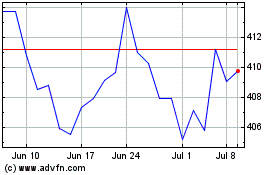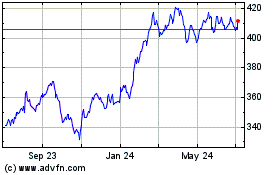By Anna Wilde Mathews, Dana Cimilluca and Emily Glazer
The high-profile health-care partnership JPMorgan Chase &
Co. struck last week with Amazon.com Inc. and Berkshire Hathaway
Inc. has created consternation among some clients of the lender's
investment-banking arm, according to people familiar with the
matter.
The new initiative, announced Tuesday, sent shock waves through
a number of health-care stocks. Its aim, to overhaul health care
for the three companies' legions of employees, sparked concern that
it could siphon business from existing health-care players.
Shares of health insurers UnitedHealth Group Inc., Cigna Corp.,
Humana Inc., Anthem Inc. and Aetna Inc. dropped after the news
emerged. Other sectors of the health-care industry also felt the
sting.
A couple of the big insurers expressed concerns to JPMorgan
officials following the announcement, some of the people said.
In a reflection of the sensitivity of the subject, JPMorgan
Chief Executive James Dimon hit the phones Tuesday to assuage
clients' concerns, people familiar with the matter said. So did
some of the firm's health-care bankers, who get paid handsomely to
help clients with mergers and other deals and worry the move could
cost them business.
"The response has been overwhelmingly positive," said JPMorgan
spokesman Brian Marchiony. "We've had hundreds of phone calls and
emails from client CEOs, doctors and health-care administrators
looking to see how they can get involved." He added, "We see this
as an opportunity to work with the industry to tackle the issues
facing our country."
On a Thursday conference call with industry analysts to discuss
earnings, Cigna CEO David Cordani said such employer moves create
"more opportunity versus less for us, because we seek to be an
integrated partner from a services standpoint."
JPMorgan, the largest U.S. bank by assets, is eager to avoid
even a small disruption to its health-care investment-banking
franchise, a powerhouse on Wall Street that took in $682 million in
revenue in the U.S. last year. Its leading market share of 14% was
trailed by Goldman Sachs Group Inc. at 10.6% and Morgan Stanley at
7%, according to Dealogic.
Though details of the project are scant, the idea is for the
three companies to launch a not-for-profit company to reduce costs
and improve the health-care experience for hundreds of thousands of
U.S. employees.
JPMorgan health-care bankers learned of the plan only at around
9 p.m. the evening before it was announced, according to people
familiar with the matter.
A small team largely including members of JPMorgan's
corporate-strategy group, which delves into big-impact projects
across the firm, quietly worked on the plan for several months with
Mr. Dimon and counterparts from Amazon and Berkshire, people
familiar with the process said. Marvelle Sullivan Berchtold, a
managing director in the strategy group, is JPMorgan's point
person. She joined the bank in August after stints as global head
of mergers and acquisitions for pharmaceutical company Novartis AG
and as a senior official at GSK Consumer Healthcare, a division of
drugmaker GlaxoSmithKline PLC.
After the plan was announced, JPMorgan bankers fielded calls
from clients concerned and confused about the impact.
Mr. Dimon began making calls from his office atop the bank's
Park Avenue headquarters, these people said. In those
conversations, Mr. Dimon told clients the planned health-care
initiative is for JPMorgan, Amazon and Berkshire employees
only.
Simultaneously, JPMorgan bankers nearby on Madison Avenue were
reiterating those points to clients, with some also telling them
the initiative is akin to a group purchasing organization, a type
of setup used by hospitals to buy supplies, so the companies can
get better deals for their employees, some of these people
said.
The bank isn't getting into business with Amazon, which earlier
jolted health-care companies with moves like adding health-care
supply options to its business-to-business marketplace. Worries
about a potential
Amazon entry into the pharmacy-services business were a factor in CVS Health Corp.'s $69 billion proposed acquisition of insurance giant Aetna.
JPMorgan bankers were also taking incoming calls from technology
companies, including health-care tech firms, intrigued by the
initiative's potential to disrupt the industry, a person familiar
with the matter said, adding that there's possibility for
additional business from those firms.
At one stage, there was discussion about whether the venture
should take over administration of employees' pharmacy and
health-insurance benefits from the current insurers and
pharmacy-benefit managers, according to a document from December
reviewed by The Wall Street Journal. But the document was an
initial proposal and that idea isn't currently on the table, people
familiar with the matter have said.
The December document also took aim at some of the industry's
middlemen, saying that past efforts to address health costs didn't
work "because they conceded the existence and role of
intermediaries (PBMs, insurance administrators, wholesale
distributors and pharmacies) which have a vested interest in
maintaining the status quo." One person with knowledge of the
matter has said the focus now is on helping the current vendors
work better, not on replacing them.
In 2017, JPMorgan spent $1.25 billion on medical benefits for
employees based in the U.S., where the medical plan covers almost
300,000 individuals, including employees and their family members,
the bank disclosed earlier in January.
Write to Anna Wilde Mathews at anna.mathews@wsj.com, Dana
Cimilluca at dana.cimilluca@wsj.com and Emily Glazer at
emily.glazer@wsj.com
(END) Dow Jones Newswires
February 04, 2018 07:14 ET (12:14 GMT)
Copyright (c) 2018 Dow Jones & Company, Inc.
Berkshire Hathaway (NYSE:BRK.B)
Historical Stock Chart
From Mar 2024 to Apr 2024

Berkshire Hathaway (NYSE:BRK.B)
Historical Stock Chart
From Apr 2023 to Apr 2024
